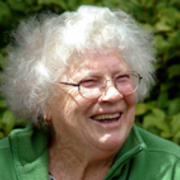
Janet Frame
Janet Frame is famed for creating unique fictional worlds, yet her biography is entwined in her works' critical and public reception. Her writing was influenced by her early life: a working class childhood during the Depression, several family tragedies, and a misdiagnosis of schizophrenia in her early 20s led to a special understanding for the poor and marginalised.
Another of Frame's key themes is that of the writer or artist struggling to survive in the face of a conformist society; a topic pointedly evidenced through her own experience: Frame narrowly escaped a lobotomy only because she had recently won a major literary prize.
Yet the focus on Frame's life as a key to unlocking the work prompted The New York Times' David Gate to note that Frame's "sanity became, and continues to be [in 2009], the subject of tedious and condescending debate - as does the degree to which her fiction was autobiographical". Reviewing Towards Another Summer he asks, "since few readers of Sylvia Plath's novel The Bell Jar (published in the same year Frame wrote Towards Another Summer) worry any more over the similarity of Esther Greenwood to her creator, why worry over [Summer protagonist] Grace Cleave?"
Frame herself warned her readers of the danger of treating her fictional statements as autobiography and long maintained her privacy. This reticence, along with the vivid interiority of her writing, might seem to make Frame a challenging subject for adaptation to screen, but her work and the drama of her life has appealed to filmmakers.
Three New Zealanders: Janet Frame (1975) is a documentary based around a lively interview - by Michael Noonan - with Frame and contains dramatised excerpts from Frame's fiction.
The first significant screen adaptation of Frame's work was A State of Siege (1978). Vincent Ward made the 50 minute film while studying at Ilam art school. Adapted from Frame's novel of the same name, A State of Siege centres around a retired art teacher (Anne Flannery) dealing with loss and loneliness, over one stormy, terrifying night. Produced by Tim White, the film announced Ward as an emerging talent. Evening Post reviewer, Frame fan and scriptwriter Michael Heath praised it as "the most sensitive and intelligent film that has ever been made in New Zealand".
An Angel at My Table (1990) saw Jane Campion adapt the three volumes of Frame's bestselling autobiography (To the Is-Land, An Angel at My Table and The Envoy from Mirror City). Produced by Bridget Ikin and starring Kerry Fox, the poetic interpretation of Frame's memoir of her early life was initially made for television, to be screened in three parts. Reaction proved so positive that it was released theatrically as a 158 minute film.
An Angel at My Table cemented Campion's international reputation (it was the first New Zealand film to be selected for the Criterion Collection on DVD) and won numerous awards, including the International Critics' Prize at Toronto Film Festival and the Grand Special Jury Price at Venice.
Campion's iconic shot of the young Frame walking down a deserted southern road visually captures the charge of Frame's writing: "Electricity, the peril the wind sings to in the wires on a gray day". Following on from the publication of Frame's prizewinning autobiography (received with unanimous acclaim in New Zealand and internationally) the film's success saw Frame's readership further swell.
Wrestling with the Angel (2004) is a 70 minute documentary based on the celebrated biography by Michael King, of the same title. Directed by Peter Bell, it explores Frame's private life and writing through the perspective of her friends and associates. King's untimely death in March 2004 meant that the interview he gave for this film was his last. King provides an informative and entertaining overview of her life.
Screen adaptations of Frame's work, particularly An Angel at My Table, have helped enshrine its reputation as a taonga of New Zealand arts, and inspired new generations to engage with "the mirror city" of Frame's imagination.